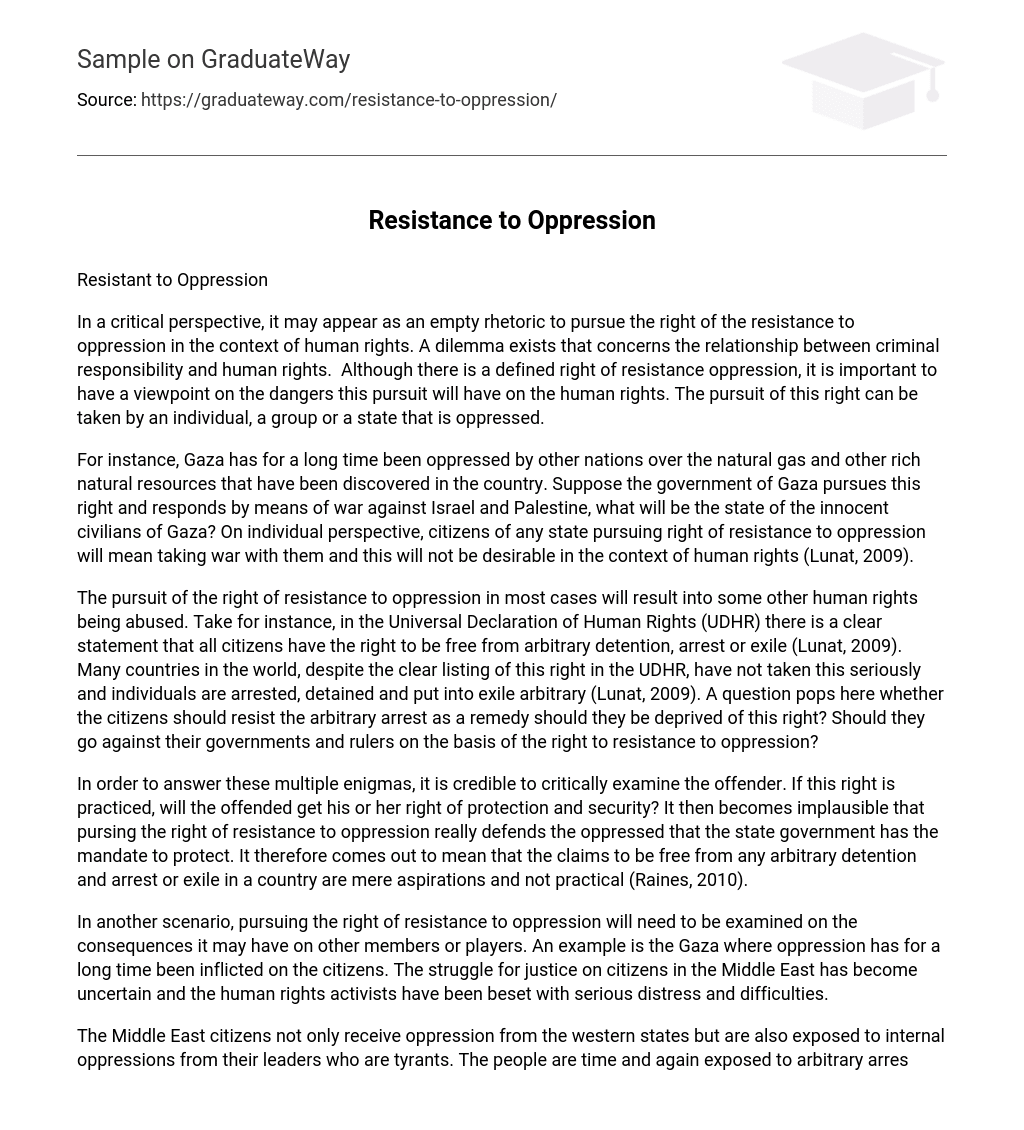In a critical perspective, it may appear as an empty rhetoric to pursue the right of the resistance to oppression in the context of human rights. A dilemma exists that concerns the relationship between criminal responsibility and human rights. Although there is a defined right of resistance oppression, it is important to have a viewpoint on the dangers this pursuit will have on the human rights. The pursuit of this right can be taken by an individual, a group or a state that is oppressed.
For instance, Gaza has for a long time been oppressed by other nations over the natural gas and other rich natural resources that have been discovered in the country. Suppose the government of Gaza pursues this right and responds by means of war against Israel and Palestine, what will be the state of the innocent civilians of Gaza? On individual perspective, citizens of any state pursuing right of resistance to oppression will mean taking war with them and this will not be desirable in the context of human rights.
The pursuit of the right of resistance to oppression in most cases will result into some other human rights being abused. Take for instance, in the Universal Declaration of Human Rights (UDHR) there is a clear statement that all citizens have the right to be free from arbitrary detention, arrest or exile. Many countries in the world, despite the clear listing of this right in the UDHR, have not taken this seriously and individuals are arrested, detained and put into exile arbitrary. A question pops here whether the citizens should resist the arbitrary arrest as a remedy should they be deprived of this right? Should they go against their governments and rulers on the basis of the right to resistance to oppression?
In order to answer these multiple enigmas, it is credible to critically examine the offender. If this right is practiced, will the offended get his or her right of protection and security? It then becomes implausible that pursing the right of resistance to oppression really defends the oppressed that the state government has the mandate to protect. It therefore comes out to mean that the claims to be free from any arbitrary detention and arrest or exile in a country are mere aspirations and not practical.
In another scenario, pursuing the right of resistance to oppression will need to be examined on the consequences it may have on other members or players. An example is the Gaza where oppression has for a long time been inflicted on the citizens. The struggle for justice on citizens in the Middle East has become uncertain and the human rights activists have been beset with serious distress and difficulties.
The Middle East citizens not only receive oppression from the western states but are also exposed to internal oppressions from their leaders who are tyrants. The people are time and again exposed to arbitrary arrest, oppression, torture and secret police. There is a lot of political stagnation, poverty, class tensions and ethnicity. It may not be practical for the citizens in the Middle East to pursue the right of resistance to oppression. Attempt to do so will grievously be dangerous. They may be killed or denied other rights given to them. This may also result to civil unrest and war.
In general; there are situations when the some of the rights such as the right of resistance to oppression should not be pursued or should be pursued consciously. These situations may include when there are dangers of more oppression or denial of other rights by the leaders of states. Other situations where the rights may not be sought may include incidents where the lives of other citizens are threatened. It may require peaceful dialogue than choose to take the direction to resist the oppression by violent means.
References
Lunat, Z. (2009). On Collaboration and Resistance of the Oppressed. Retrieved May 7, 2010, from http://electronicintifada.net/v2/article10103.shtml
Raines, J. (2010). Righteous Resistance and Martin Luther King, Jr. Retrieved May 7, 2010, from http://www.religion-online.org/showarticle.asp?title=1365





